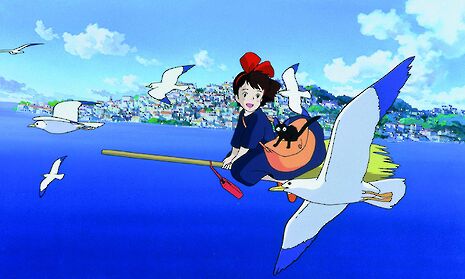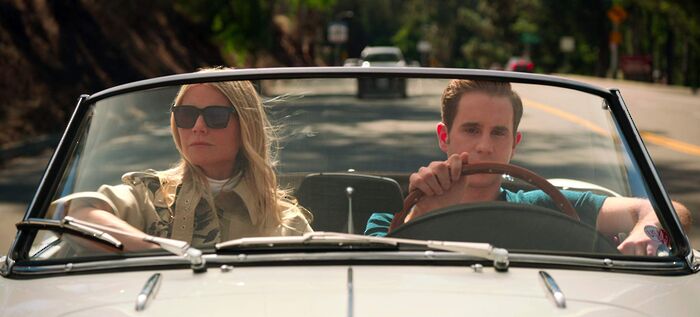‘Soaring all alone and on my own’ – how Kiki’s Delivery Service changed my outlook on the year abroad
The Studio Ghibli classic helped Sarah Brady realise that it’s okay to feel vulnerable far from home

Content Note: This article contains a brief mention of street harassment.
Kiki’s Delivery Service (1989) details a year in the life of Kiki, a headstrong 13-year-old and fledgling witch about to fly the nest – on her mother’s broomstick – in an age-old quest for independence and identity. As per tradition, she is to settle in the first witch-deficient town she happens upon and spend a year there, honing her magical abilities.
A childhood favourite of mine, I had almost overlooked its relevance when I stumbled across it a week ago, on a quest for some Ghibli-induced-serotonin.
For those who’ve taken Modern and Medieval Languages, the plot will skirt uncomfortably close to the infamous Year Abroad (especially the part about arriving in your chosen country by broom). The film deals with the self-doubt, vulnerability and isolation often experienced by those living abroad and proves to be a cathartic – or at least comforting – watch.
Having recently intermitted while on my year abroad and still feeling quite sensitive about the whole thing, it was soothing to hear Kiki’s father lovingly reassure her that, should things go awry, she can always return home.
“Vulnerability does not equate to failure”
Caught in the bliss of that tender moment, I was unprepared for when Kiki, with all the tact of an average thirteen-year-old, replies: “And come back a failure?” followed by mock-gagging. I winced and turned the film off. It was only once my ego had recovered, several days later, that I returned to finish the film.
Kiki, like many, begins her year a perfectionist. She is eager to prove herself and test her abilities, despite struggling even to fly her broom. Kiki’s flying is unsteady at best and dangerous at worst; within minutes of arriving in her town, she causes a multi-car pileup and crashes into several pedestrians while hurtling down the pavement.
By the end of her first day, her enthusiasm is waning: she hasn’t found accommodation or employment, she has experienced street harassment and she has almost been arrested. However, Kiki gets her lucky break when she finds work running an air courier service for a bakery.
After several delivery-related mishaps and even more social ones, Kiki becomes listless and depressed. Her year abroad is falling short of her expectations: she feels like an outsider, her passion has waned since relying on it for income and her black cat, Jiji, has lost the ability to speak. Her despondency manifests as a loss of her magical powers: she can no longer fly. In a fit of despair, she flops face-first onto her bed and stays there, wrapped in a blanket cocoon. We’ve all been there.
As ever in times of spiritual crisis, rescue comes in the form of a bohemian woman who lives in the woods: Ursula, a friend of Kiki’s. Ursula invites her to spend some time away from the city in her cabin – an offer which Kiki accepts, hoping some time away will cure her inability to fly. (If you do not have access to a log-cabin-owning bohemian, then just call your friends at home, or something).
As a remedy, Ursula urges Kiki to take long walks, appreciate the scenery and doze off at noon. Simply put, Ursula encourages her to enjoy her time alone instead of fretting that she has fallen short of anyone’s expectations, emphasising the importance of self-compassion.
In Kiki’s Delivery Service, vulnerability does not equate to failure. It can, rather, be an opportunity for introspection and evolution. It is a comforting watch for anyone despairing alone in a foreign country, reminding us that the year abroad is for personal as much as academic growth. Any expectations you have must not punish any growing pains, but accommodate them.
 News / Cambridge academics sign open letter criticising research funding changes22 February 2026
News / Cambridge academics sign open letter criticising research funding changes22 February 2026 News / Supporters protest potential vet school closure22 February 2026
News / Supporters protest potential vet school closure22 February 2026 News / University Council rescinds University Centre membership20 February 2026
News / University Council rescinds University Centre membership20 February 2026 News / Hundreds of Cambridge academics demand vote on fate of vet course20 February 2026
News / Hundreds of Cambridge academics demand vote on fate of vet course20 February 2026 Comment / A tongue-in-cheek petition for gowned exams at Cambridge 21 February 2026
Comment / A tongue-in-cheek petition for gowned exams at Cambridge 21 February 2026









